 TensorFlow.org'da görüntüleyin TensorFlow.org'da görüntüleyin |  Google Colab'da çalıştırın Google Colab'da çalıştırın |  GitHub'da görüntüle GitHub'da görüntüle |  Not defterini indir Not defterini indir |  TF Hub modeline bakın TF Hub modeline bakın |
Bu ortak çalışma, TensorFlow Hub'dan indirilen SPICE modelinin nasıl kullanılacağını gösterecektir.
sudo apt-get install -q -y timidity libsndfile1
Reading package lists... Building dependency tree... Reading state information... The following packages were automatically installed and are no longer required: linux-gcp-5.4-headers-5.4.0-1040 linux-gcp-5.4-headers-5.4.0-1043 linux-gcp-5.4-headers-5.4.0-1044 linux-gcp-5.4-headers-5.4.0-1049 linux-headers-5.4.0-1049-gcp linux-image-5.4.0-1049-gcp linux-modules-5.4.0-1049-gcp linux-modules-extra-5.4.0-1049-gcp Use 'sudo apt autoremove' to remove them. The following additional packages will be installed: freepats libaudio2 libflac8 libjack-jackd2-0 libogg0 libsamplerate0 libvorbis0a libvorbisenc2 timidity-daemon Suggested packages: nas jackd2 fluid-soundfont-gm fluid-soundfont-gs pmidi The following NEW packages will be installed: freepats libaudio2 libflac8 libjack-jackd2-0 libogg0 libsamplerate0 libsndfile1 libvorbis0a libvorbisenc2 timidity timidity-daemon 0 upgraded, 11 newly installed, 0 to remove and 143 not upgraded. Need to get 31.4 MB of archives. After this operation, 40.4 MB of additional disk space will be used. Get:1 http://asia-east1.gce.archive.ubuntu.com/ubuntu bionic/main amd64 libogg0 amd64 1.3.2-1 [17.2 kB] Get:2 http://asia-east1.gce.archive.ubuntu.com/ubuntu bionic/universe amd64 freepats all 20060219-1 [29.0 MB] Get:3 http://asia-east1.gce.archive.ubuntu.com/ubuntu bionic/main amd64 libaudio2 amd64 1.9.4-6 [50.3 kB] Get:4 http://asia-east1.gce.archive.ubuntu.com/ubuntu bionic/main amd64 libflac8 amd64 1.3.2-1 [213 kB] Get:5 http://asia-east1.gce.archive.ubuntu.com/ubuntu bionic/main amd64 libsamplerate0 amd64 0.1.9-1 [938 kB] Get:6 http://asia-east1.gce.archive.ubuntu.com/ubuntu bionic/main amd64 libjack-jackd2-0 amd64 1.9.12~dfsg-2 [263 kB] Get:7 http://asia-east1.gce.archive.ubuntu.com/ubuntu bionic/main amd64 libvorbis0a amd64 1.3.5-4.2 [86.4 kB] Get:8 http://asia-east1.gce.archive.ubuntu.com/ubuntu bionic/main amd64 libvorbisenc2 amd64 1.3.5-4.2 [70.7 kB] Get:9 http://asia-east1.gce.archive.ubuntu.com/ubuntu bionic-updates/main amd64 libsndfile1 amd64 1.0.28-4ubuntu0.18.04.2 [170 kB] Get:10 http://asia-east1.gce.archive.ubuntu.com/ubuntu bionic/universe amd64 timidity amd64 2.13.2-41 [585 kB] Get:11 http://asia-east1.gce.archive.ubuntu.com/ubuntu bionic/universe amd64 timidity-daemon all 2.13.2-41 [5984 B] Fetched 31.4 MB in 2s (14.5 MB/s) Selecting previously unselected package libogg0:amd64. (Reading database ... 281949 files and directories currently installed.) Preparing to unpack .../00-libogg0_1.3.2-1_amd64.deb ... Unpacking libogg0:amd64 (1.3.2-1) ... Selecting previously unselected package freepats. Preparing to unpack .../01-freepats_20060219-1_all.deb ... Unpacking freepats (20060219-1) ... Selecting previously unselected package libaudio2:amd64. Preparing to unpack .../02-libaudio2_1.9.4-6_amd64.deb ... Unpacking libaudio2:amd64 (1.9.4-6) ... Selecting previously unselected package libflac8:amd64. Preparing to unpack .../03-libflac8_1.3.2-1_amd64.deb ... Unpacking libflac8:amd64 (1.3.2-1) ... Selecting previously unselected package libsamplerate0:amd64. Preparing to unpack .../04-libsamplerate0_0.1.9-1_amd64.deb ... Unpacking libsamplerate0:amd64 (0.1.9-1) ... Selecting previously unselected package libjack-jackd2-0:amd64. Preparing to unpack .../05-libjack-jackd2-0_1.9.12~dfsg-2_amd64.deb ... Unpacking libjack-jackd2-0:amd64 (1.9.12~dfsg-2) ... Selecting previously unselected package libvorbis0a:amd64. Preparing to unpack .../06-libvorbis0a_1.3.5-4.2_amd64.deb ... Unpacking libvorbis0a:amd64 (1.3.5-4.2) ... Selecting previously unselected package libvorbisenc2:amd64. Preparing to unpack .../07-libvorbisenc2_1.3.5-4.2_amd64.deb ... Unpacking libvorbisenc2:amd64 (1.3.5-4.2) ... Selecting previously unselected package libsndfile1:amd64. Preparing to unpack .../08-libsndfile1_1.0.28-4ubuntu0.18.04.2_amd64.deb ... Unpacking libsndfile1:amd64 (1.0.28-4ubuntu0.18.04.2) ... Selecting previously unselected package timidity. Preparing to unpack .../09-timidity_2.13.2-41_amd64.deb ... Unpacking timidity (2.13.2-41) ... Selecting previously unselected package timidity-daemon. Preparing to unpack .../10-timidity-daemon_2.13.2-41_all.deb ... Unpacking timidity-daemon (2.13.2-41) ... Setting up libogg0:amd64 (1.3.2-1) ... Setting up libsamplerate0:amd64 (0.1.9-1) ... Setting up freepats (20060219-1) ... Setting up libvorbis0a:amd64 (1.3.5-4.2) ... Setting up libaudio2:amd64 (1.9.4-6) ... Setting up libflac8:amd64 (1.3.2-1) ... Setting up libjack-jackd2-0:amd64 (1.9.12~dfsg-2) ... Setting up libvorbisenc2:amd64 (1.3.5-4.2) ... Setting up timidity (2.13.2-41) ... Setting up libsndfile1:amd64 (1.0.28-4ubuntu0.18.04.2) ... Setting up timidity-daemon (2.13.2-41) ... Adding group timidity....done Adding system user timidity....done Adding user `timidity' to group `audio' ... Adding user timidity to group audio Done. Processing triggers for man-db (2.8.3-2ubuntu0.1) ... Processing triggers for ureadahead (0.100.0-21) ... Processing triggers for libc-bin (2.27-3ubuntu1.2) ... Processing triggers for systemd (237-3ubuntu10.50) ...
# All the imports to deal with sound datapip install pydub numba==0.48 librosa music21
import tensorflow as tf
import tensorflow_hub as hub
import numpy as np
import matplotlib.pyplot as plt
import librosa
from librosa import display as librosadisplay
import logging
import math
import statistics
import sys
from IPython.display import Audio, Javascript
from scipy.io import wavfile
from base64 import b64decode
import music21
from pydub import AudioSegment
logger = logging.getLogger()
logger.setLevel(logging.ERROR)
print("tensorflow: %s" % tf.__version__)
#print("librosa: %s" % librosa.__version__)
/tmpfs/src/tf_docs_env/lib/python3.7/site-packages/numba/errors.py:137: UserWarning: Insufficiently recent colorama version found. Numba requires colorama >= 0.3.9
warnings.warn(msg)
tensorflow: 2.7.0
/tmpfs/src/tf_docs_env/lib/python3.7/site-packages/pydub/utils.py:170: RuntimeWarning: Couldn't find ffmpeg or avconv - defaulting to ffmpeg, but may not work
warn("Couldn't find ffmpeg or avconv - defaulting to ffmpeg, but may not work", RuntimeWarning)
Ses giriş dosyası
Şimdi en zor kısım: Şarkınızı kaydedin! :)
Bir ses dosyası elde etmek için dört yöntem sunuyoruz:
- Sesi doğrudan Colab'de kaydedin
- Bilgisayarınızdan yükleyin
- Google Drive'da kayıtlı bir dosyayı kullanın
- Dosyayı internetten indirin
Aşağıdaki dört yöntemden birini seçin.
[Bunu çalıştırın] Sesi doğrudan tarayıcıdan kaydetmek için JS kodunun tanımı
RECORD = """
const sleep = time => new Promise(resolve => setTimeout(resolve, time))
const b2text = blob => new Promise(resolve => {
const reader = new FileReader()
reader.onloadend = e => resolve(e.srcElement.result)
reader.readAsDataURL(blob)
})
var record = time => new Promise(async resolve => {
stream = await navigator.mediaDevices.getUserMedia({ audio: true })
recorder = new MediaRecorder(stream)
chunks = []
recorder.ondataavailable = e => chunks.push(e.data)
recorder.start()
await sleep(time)
recorder.onstop = async ()=>{
blob = new Blob(chunks)
text = await b2text(blob)
resolve(text)
}
recorder.stop()
})
"""
def record(sec=5):
try:
from google.colab import output
except ImportError:
print('No possible to import output from google.colab')
return ''
else:
print('Recording')
display(Javascript(RECORD))
s = output.eval_js('record(%d)' % (sec*1000))
fname = 'recorded_audio.wav'
print('Saving to', fname)
b = b64decode(s.split(',')[1])
with open(fname, 'wb') as f:
f.write(b)
return fname
Sesinizin nasıl girileceğini seçin
INPUT_SOURCE = 'https://storage.googleapis.com/download.tensorflow.org/data/c-scale-metronome.wav'
print('You selected', INPUT_SOURCE)
if INPUT_SOURCE == 'RECORD':
uploaded_file_name = record(5)
elif INPUT_SOURCE == 'UPLOAD':
try:
from google.colab import files
except ImportError:
print("ImportError: files from google.colab seems to not be available")
else:
uploaded = files.upload()
for fn in uploaded.keys():
print('User uploaded file "{name}" with length {length} bytes'.format(
name=fn, length=len(uploaded[fn])))
uploaded_file_name = next(iter(uploaded))
print('Uploaded file: ' + uploaded_file_name)
elif INPUT_SOURCE.startswith('./drive/'):
try:
from google.colab import drive
except ImportError:
print("ImportError: files from google.colab seems to not be available")
else:
drive.mount('/content/drive')
# don't forget to change the name of the file you
# will you here!
gdrive_audio_file = 'YOUR_MUSIC_FILE.wav'
uploaded_file_name = INPUT_SOURCE
elif INPUT_SOURCE.startswith('http'):
!wget --no-check-certificate 'https://storage.googleapis.com/download.tensorflow.org/data/c-scale-metronome.wav' -O c-scale.wav
uploaded_file_name = 'c-scale.wav'
else:
print('Unrecognized input format!')
print('Please select "RECORD", "UPLOAD", or specify a file hosted on Google Drive or a file from the web to download file to download')
You selected https://storage.googleapis.com/download.tensorflow.org/data/c-scale-metronome.wav --2021-11-05 11:10:55-- https://storage.googleapis.com/download.tensorflow.org/data/c-scale-metronome.wav Resolving storage.googleapis.com (storage.googleapis.com)... 108.177.97.128, 64.233.189.128, 74.125.203.128, ... Connecting to storage.googleapis.com (storage.googleapis.com)|108.177.97.128|:443... connected. HTTP request sent, awaiting response... 200 OK Length: 384728 (376K) [audio/wav] Saving to: ‘c-scale.wav’ c-scale.wav 100%[===================>] 375.71K --.-KB/s in 0.006s 2021-11-05 11:10:56 (65.4 MB/s) - ‘c-scale.wav’ saved [384728/384728]
Ses verilerinin hazırlanması
Şimdi sesimiz var, onu beklenen formata dönüştürelim ve sonra dinleyelim!
SPICE modeli, giriş olarak 16kHz örnekleme hızında ve yalnızca bir kanallı (mono) bir ses dosyasına ihtiyaç duyar.
Bu aşamasında size yardımcı olmak için, bir işlev (yarattı convert_audio_for_model modelin beklenen formata sahip herhangi bir wav dosyası dönüştürmek için):
# Function that converts the user-created audio to the format that the model
# expects: bitrate 16kHz and only one channel (mono).
EXPECTED_SAMPLE_RATE = 16000
def convert_audio_for_model(user_file, output_file='converted_audio_file.wav'):
audio = AudioSegment.from_file(user_file)
audio = audio.set_frame_rate(EXPECTED_SAMPLE_RATE).set_channels(1)
audio.export(output_file, format="wav")
return output_file
# Converting to the expected format for the model
# in all the input 4 input method before, the uploaded file name is at
# the variable uploaded_file_name
converted_audio_file = convert_audio_for_model(uploaded_file_name)
# Loading audio samples from the wav file:
sample_rate, audio_samples = wavfile.read(converted_audio_file, 'rb')
# Show some basic information about the audio.
duration = len(audio_samples)/sample_rate
print(f'Sample rate: {sample_rate} Hz')
print(f'Total duration: {duration:.2f}s')
print(f'Size of the input: {len(audio_samples)}')
# Let's listen to the wav file.
Audio(audio_samples, rate=sample_rate)
Sample rate: 16000 Hz Total duration: 11.89s Size of the input: 190316
İlk olarak, şarkı söylememizin dalga biçimine bir göz atalım.
# We can visualize the audio as a waveform.
_ = plt.plot(audio_samples)
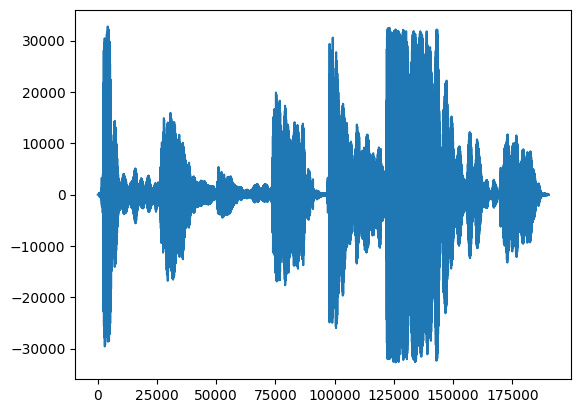
Daha detaylı görselleştirme spektrogram gösterir frekansları zaman mevcut.
Burada, şarkı söylemeyi daha net bir şekilde görünür kılmak için logaritmik bir frekans ölçeği kullanıyoruz.
MAX_ABS_INT16 = 32768.0
def plot_stft(x, sample_rate, show_black_and_white=False):
x_stft = np.abs(librosa.stft(x, n_fft=2048))
fig, ax = plt.subplots()
fig.set_size_inches(20, 10)
x_stft_db = librosa.amplitude_to_db(x_stft, ref=np.max)
if(show_black_and_white):
librosadisplay.specshow(data=x_stft_db, y_axis='log',
sr=sample_rate, cmap='gray_r')
else:
librosadisplay.specshow(data=x_stft_db, y_axis='log', sr=sample_rate)
plt.colorbar(format='%+2.0f dB')
plot_stft(audio_samples / MAX_ABS_INT16 , sample_rate=EXPECTED_SAMPLE_RATE)
plt.show()
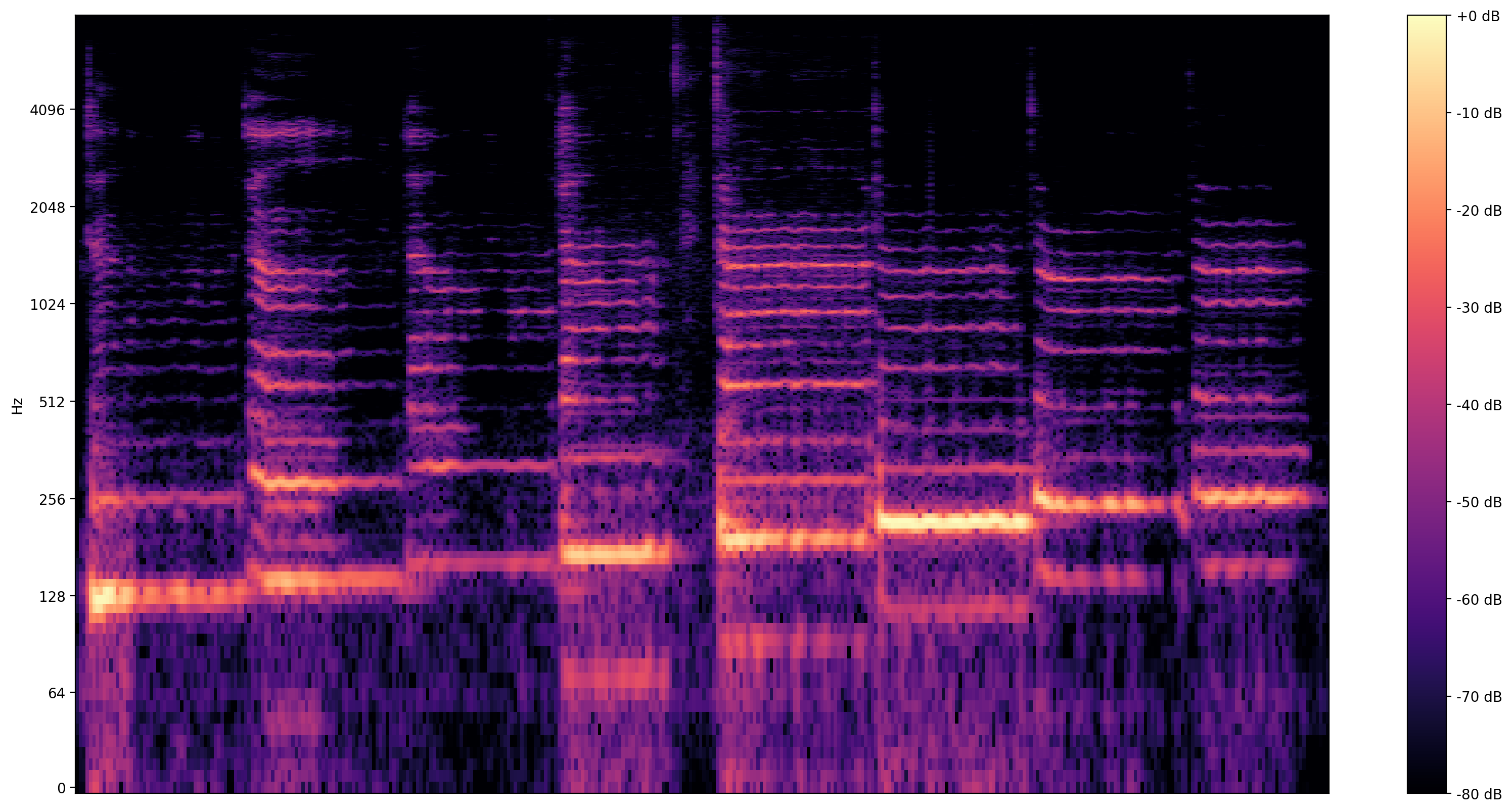
Burada son bir dönüşüme ihtiyacımız var. Ses örnekleri int16 formatındadır. -1 ile 1 arasında yüzecek şekilde normalleştirilmeleri gerekir.
audio_samples = audio_samples / float(MAX_ABS_INT16)
Modelin Yürütülmesi
Şimdi, TensorFlow Hub modeli yük izin ve buna ses beslemek kolay kısmıdır. SPICE bize iki çıktı verecek: adım ve belirsizlik
TensorFlow Hub makine öğrenme modellerinin yeniden parçaların yayınlanması, keşif ve tüketim için bir kütüphanedir. Zorluklarınızı çözmek için makine öğrenimini kullanmayı kolaylaştırır.
Modeli yüklemek için Hub modülüne ve modeli gösteren URL'ye ihtiyacınız var:
# Loading the SPICE model is easy:
model = hub.load("https://tfhub.dev/google/spice/2")
WARNING:tensorflow:Unable to create a python object for variable <tf.Variable 'global_step:0' shape=() dtype=int64_ref> because it is a reference variable. It may not be visible to training APIs. If this is a problem, consider rebuilding the SavedModel after running tf.compat.v1.enable_resource_variables(). WARNING:tensorflow:Unable to create a python object for variable <tf.Variable 'global_step:0' shape=() dtype=int64_ref> because it is a reference variable. It may not be visible to training APIs. If this is a problem, consider rebuilding the SavedModel after running tf.compat.v1.enable_resource_variables(). WARNING:tensorflow:Unable to create a python object for variable <tf.Variable 'encoder/conv2d/kernel:0' shape=(1, 3, 1, 64) dtype=float32_ref> because it is a reference variable. It may not be visible to training APIs. If this is a problem, consider rebuilding the SavedModel after running tf.compat.v1.enable_resource_variables(). WARNING:tensorflow:Unable to create a python object for variable <tf.Variable 'encoder/conv2d/kernel:0' shape=(1, 3, 1, 64) dtype=float32_ref> because it is a reference variable. It may not be visible to training APIs. If this is a problem, consider rebuilding the SavedModel after running tf.compat.v1.enable_resource_variables(). WARNING:tensorflow:Unable to create a python object for variable <tf.Variable 'encoder/batch_normalization/gamma:0' shape=(64,) dtype=float32_ref> because it is a reference variable. It may not be visible to training APIs. If this is a problem, consider rebuilding the SavedModel after running tf.compat.v1.enable_resource_variables(). WARNING:tensorflow:Unable to create a python object for variable <tf.Variable 'encoder/batch_normalization/gamma:0' shape=(64,) dtype=float32_ref> because it is a reference variable. It may not be visible to training APIs. If this is a problem, consider rebuilding the SavedModel after running tf.compat.v1.enable_resource_variables(). WARNING:tensorflow:Unable to create a python object for variable <tf.Variable 'encoder/batch_normalization/beta:0' shape=(64,) dtype=float32_ref> because it is a reference variable. It may not be visible to training APIs. If this is a problem, consider rebuilding the SavedModel after running tf.compat.v1.enable_resource_variables(). WARNING:tensorflow:Unable to create a python object for variable <tf.Variable 'encoder/batch_normalization/beta:0' shape=(64,) dtype=float32_ref> because it is a reference variable. It may not be visible to training APIs. If this is a problem, consider rebuilding the SavedModel after running tf.compat.v1.enable_resource_variables(). WARNING:tensorflow:Unable to create a python object for variable <tf.Variable 'encoder/batch_normalization/moving_mean:0' shape=(64,) dtype=float32_ref> because it is a reference variable. It may not be visible to training APIs. If this is a problem, consider rebuilding the SavedModel after running tf.compat.v1.enable_resource_variables(). WARNING:tensorflow:Unable to create a python object for variable <tf.Variable 'encoder/batch_normalization/moving_mean:0' shape=(64,) dtype=float32_ref> because it is a reference variable. It may not be visible to training APIs. If this is a problem, consider rebuilding the SavedModel after running tf.compat.v1.enable_resource_variables(). WARNING:tensorflow:Unable to create a python object for variable <tf.Variable 'global_step:0' shape=() dtype=int64_ref> because it is a reference variable. It may not be visible to training APIs. If this is a problem, consider rebuilding the SavedModel after running tf.compat.v1.enable_resource_variables(). WARNING:tensorflow:Unable to create a python object for variable <tf.Variable 'global_step:0' shape=() dtype=int64_ref> because it is a reference variable. It may not be visible to training APIs. If this is a problem, consider rebuilding the SavedModel after running tf.compat.v1.enable_resource_variables(). WARNING:tensorflow:Unable to create a python object for variable <tf.Variable 'encoder/conv2d/kernel:0' shape=(1, 3, 1, 64) dtype=float32_ref> because it is a reference variable. It may not be visible to training APIs. If this is a problem, consider rebuilding the SavedModel after running tf.compat.v1.enable_resource_variables(). WARNING:tensorflow:Unable to create a python object for variable <tf.Variable 'encoder/conv2d/kernel:0' shape=(1, 3, 1, 64) dtype=float32_ref> because it is a reference variable. It may not be visible to training APIs. If this is a problem, consider rebuilding the SavedModel after running tf.compat.v1.enable_resource_variables(). WARNING:tensorflow:Unable to create a python object for variable <tf.Variable 'encoder/batch_normalization/gamma:0' shape=(64,) dtype=float32_ref> because it is a reference variable. It may not be visible to training APIs. If this is a problem, consider rebuilding the SavedModel after running tf.compat.v1.enable_resource_variables(). WARNING:tensorflow:Unable to create a python object for variable <tf.Variable 'encoder/batch_normalization/gamma:0' shape=(64,) dtype=float32_ref> because it is a reference variable. It may not be visible to training APIs. If this is a problem, consider rebuilding the SavedModel after running tf.compat.v1.enable_resource_variables(). WARNING:tensorflow:Unable to create a python object for variable <tf.Variable 'encoder/batch_normalization/beta:0' shape=(64,) dtype=float32_ref> because it is a reference variable. It may not be visible to training APIs. If this is a problem, consider rebuilding the SavedModel after running tf.compat.v1.enable_resource_variables(). WARNING:tensorflow:Unable to create a python object for variable <tf.Variable 'encoder/batch_normalization/beta:0' shape=(64,) dtype=float32_ref> because it is a reference variable. It may not be visible to training APIs. If this is a problem, consider rebuilding the SavedModel after running tf.compat.v1.enable_resource_variables(). WARNING:tensorflow:Unable to create a python object for variable <tf.Variable 'encoder/batch_normalization/moving_mean:0' shape=(64,) dtype=float32_ref> because it is a reference variable. It may not be visible to training APIs. If this is a problem, consider rebuilding the SavedModel after running tf.compat.v1.enable_resource_variables(). WARNING:tensorflow:Unable to create a python object for variable <tf.Variable 'encoder/batch_normalization/moving_mean:0' shape=(64,) dtype=float32_ref> because it is a reference variable. It may not be visible to training APIs. If this is a problem, consider rebuilding the SavedModel after running tf.compat.v1.enable_resource_variables(). WARNING:tensorflow:Unable to create a python object for variable <tf.Variable 'global_step:0' shape=() dtype=int64_ref> because it is a reference variable. It may not be visible to training APIs. If this is a problem, consider rebuilding the SavedModel after running tf.compat.v1.enable_resource_variables(). WARNING:tensorflow:Unable to create a python object for variable <tf.Variable 'global_step:0' shape=() dtype=int64_ref> because it is a reference variable. It may not be visible to training APIs. If this is a problem, consider rebuilding the SavedModel after running tf.compat.v1.enable_resource_variables(). WARNING:tensorflow:Unable to create a python object for variable <tf.Variable 'encoder/conv2d/kernel:0' shape=(1, 3, 1, 64) dtype=float32_ref> because it is a reference variable. It may not be visible to training APIs. If this is a problem, consider rebuilding the SavedModel after running tf.compat.v1.enable_resource_variables(). WARNING:tensorflow:Unable to create a python object for variable <tf.Variable 'encoder/conv2d/kernel:0' shape=(1, 3, 1, 64) dtype=float32_ref> because it is a reference variable. It may not be visible to training APIs. If this is a problem, consider rebuilding the SavedModel after running tf.compat.v1.enable_resource_variables(). WARNING:tensorflow:Unable to create a python object for variable <tf.Variable 'encoder/batch_normalization/gamma:0' shape=(64,) dtype=float32_ref> because it is a reference variable. It may not be visible to training APIs. If this is a problem, consider rebuilding the SavedModel after running tf.compat.v1.enable_resource_variables(). WARNING:tensorflow:Unable to create a python object for variable <tf.Variable 'encoder/batch_normalization/gamma:0' shape=(64,) dtype=float32_ref> because it is a reference variable. It may not be visible to training APIs. If this is a problem, consider rebuilding the SavedModel after running tf.compat.v1.enable_resource_variables(). WARNING:tensorflow:Unable to create a python object for variable <tf.Variable 'encoder/batch_normalization/beta:0' shape=(64,) dtype=float32_ref> because it is a reference variable. It may not be visible to training APIs. If this is a problem, consider rebuilding the SavedModel after running tf.compat.v1.enable_resource_variables(). WARNING:tensorflow:Unable to create a python object for variable <tf.Variable 'encoder/batch_normalization/beta:0' shape=(64,) dtype=float32_ref> because it is a reference variable. It may not be visible to training APIs. If this is a problem, consider rebuilding the SavedModel after running tf.compat.v1.enable_resource_variables(). WARNING:tensorflow:Unable to create a python object for variable <tf.Variable 'encoder/batch_normalization/moving_mean:0' shape=(64,) dtype=float32_ref> because it is a reference variable. It may not be visible to training APIs. If this is a problem, consider rebuilding the SavedModel after running tf.compat.v1.enable_resource_variables(). WARNING:tensorflow:Unable to create a python object for variable <tf.Variable 'encoder/batch_normalization/moving_mean:0' shape=(64,) dtype=float32_ref> because it is a reference variable. It may not be visible to training APIs. If this is a problem, consider rebuilding the SavedModel after running tf.compat.v1.enable_resource_variables(). WARNING:tensorflow:Unable to create a python object for variable <tf.Variable 'global_step:0' shape=() dtype=int64_ref> because it is a reference variable. It may not be visible to training APIs. If this is a problem, consider rebuilding the SavedModel after running tf.compat.v1.enable_resource_variables(). WARNING:tensorflow:Unable to create a python object for variable <tf.Variable 'global_step:0' shape=() dtype=int64_ref> because it is a reference variable. It may not be visible to training APIs. If this is a problem, consider rebuilding the SavedModel after running tf.compat.v1.enable_resource_variables(). WARNING:tensorflow:Unable to create a python object for variable <tf.Variable 'encoder/conv2d/kernel:0' shape=(1, 3, 1, 64) dtype=float32_ref> because it is a reference variable. It may not be visible to training APIs. If this is a problem, consider rebuilding the SavedModel after running tf.compat.v1.enable_resource_variables(). WARNING:tensorflow:Unable to create a python object for variable <tf.Variable 'encoder/conv2d/kernel:0' shape=(1, 3, 1, 64) dtype=float32_ref> because it is a reference variable. It may not be visible to training APIs. If this is a problem, consider rebuilding the SavedModel after running tf.compat.v1.enable_resource_variables(). WARNING:tensorflow:Unable to create a python object for variable <tf.Variable 'encoder/batch_normalization/gamma:0' shape=(64,) dtype=float32_ref> because it is a reference variable. It may not be visible to training APIs. If this is a problem, consider rebuilding the SavedModel after running tf.compat.v1.enable_resource_variables(). WARNING:tensorflow:Unable to create a python object for variable <tf.Variable 'encoder/batch_normalization/gamma:0' shape=(64,) dtype=float32_ref> because it is a reference variable. It may not be visible to training APIs. If this is a problem, consider rebuilding the SavedModel after running tf.compat.v1.enable_resource_variables(). WARNING:tensorflow:Unable to create a python object for variable <tf.Variable 'encoder/batch_normalization/beta:0' shape=(64,) dtype=float32_ref> because it is a reference variable. It may not be visible to training APIs. If this is a problem, consider rebuilding the SavedModel after running tf.compat.v1.enable_resource_variables(). WARNING:tensorflow:Unable to create a python object for variable <tf.Variable 'encoder/batch_normalization/beta:0' shape=(64,) dtype=float32_ref> because it is a reference variable. It may not be visible to training APIs. If this is a problem, consider rebuilding the SavedModel after running tf.compat.v1.enable_resource_variables(). WARNING:tensorflow:Unable to create a python object for variable <tf.Variable 'encoder/batch_normalization/moving_mean:0' shape=(64,) dtype=float32_ref> because it is a reference variable. It may not be visible to training APIs. If this is a problem, consider rebuilding the SavedModel after running tf.compat.v1.enable_resource_variables(). WARNING:tensorflow:Unable to create a python object for variable <tf.Variable 'encoder/batch_normalization/moving_mean:0' shape=(64,) dtype=float32_ref> because it is a reference variable. It may not be visible to training APIs. If this is a problem, consider rebuilding the SavedModel after running tf.compat.v1.enable_resource_variables().
Model yüklendiğinde, veriler hazırlandığında, sonucu almak için 3 satıra ihtiyacımız var:
# We now feed the audio to the SPICE tf.hub model to obtain pitch and uncertainty outputs as tensors.
model_output = model.signatures["serving_default"](tf.constant(audio_samples, tf.float32))
pitch_outputs = model_output["pitch"]
uncertainty_outputs = model_output["uncertainty"]
# 'Uncertainty' basically means the inverse of confidence.
confidence_outputs = 1.0 - uncertainty_outputs
fig, ax = plt.subplots()
fig.set_size_inches(20, 10)
plt.plot(pitch_outputs, label='pitch')
plt.plot(confidence_outputs, label='confidence')
plt.legend(loc="lower right")
plt.show()
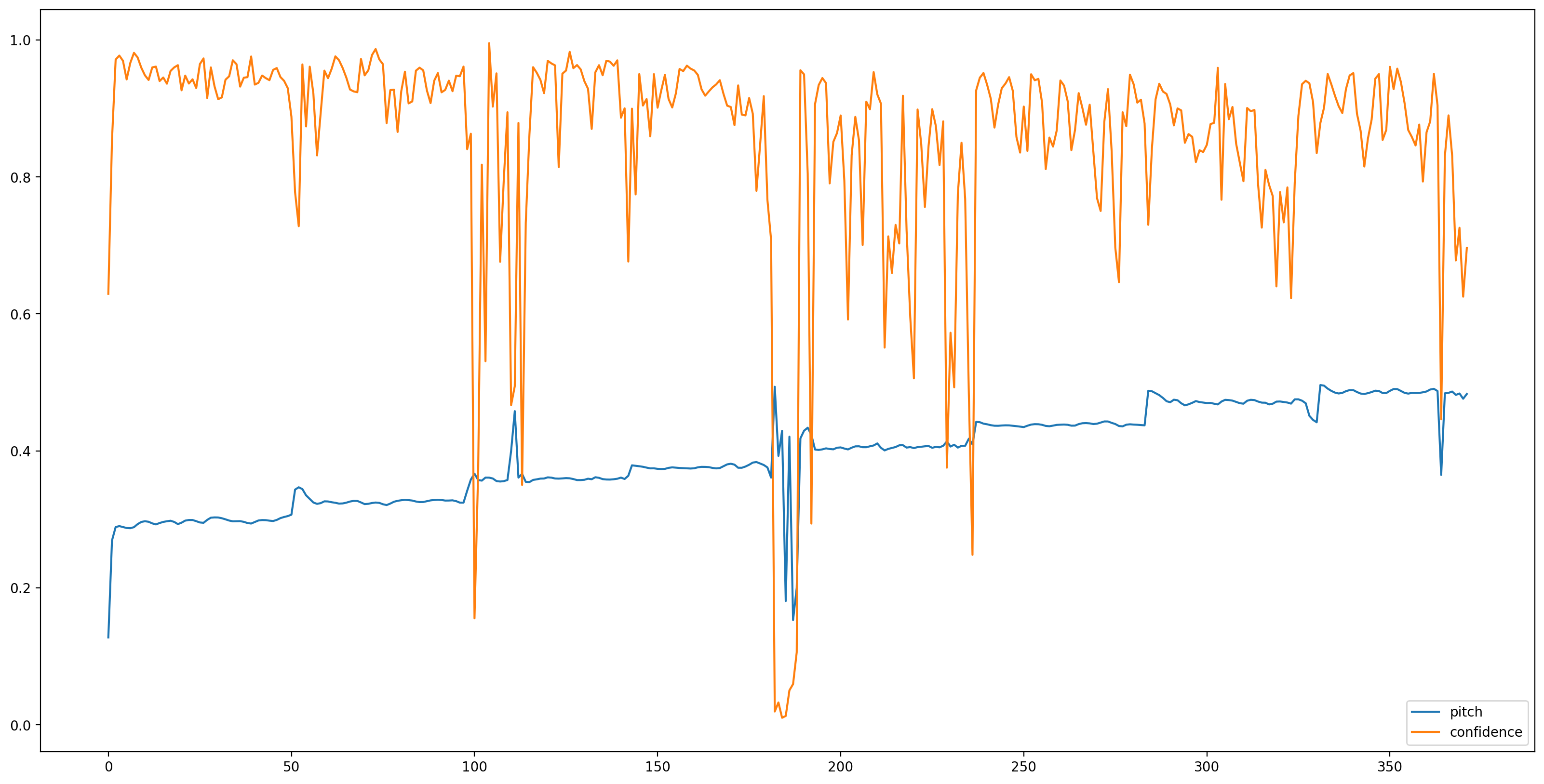
Tüm adım tahminlerini düşük güvenle (güven < 0.9) kaldırarak sonuçların daha kolay anlaşılmasını sağlayalım ve kalanları çizelim.
confidence_outputs = list(confidence_outputs)
pitch_outputs = [ float(x) for x in pitch_outputs]
indices = range(len (pitch_outputs))
confident_pitch_outputs = [ (i,p)
for i, p, c in zip(indices, pitch_outputs, confidence_outputs) if c >= 0.9 ]
confident_pitch_outputs_x, confident_pitch_outputs_y = zip(*confident_pitch_outputs)
fig, ax = plt.subplots()
fig.set_size_inches(20, 10)
ax.set_ylim([0, 1])
plt.scatter(confident_pitch_outputs_x, confident_pitch_outputs_y, )
plt.scatter(confident_pitch_outputs_x, confident_pitch_outputs_y, c="r")
plt.show()
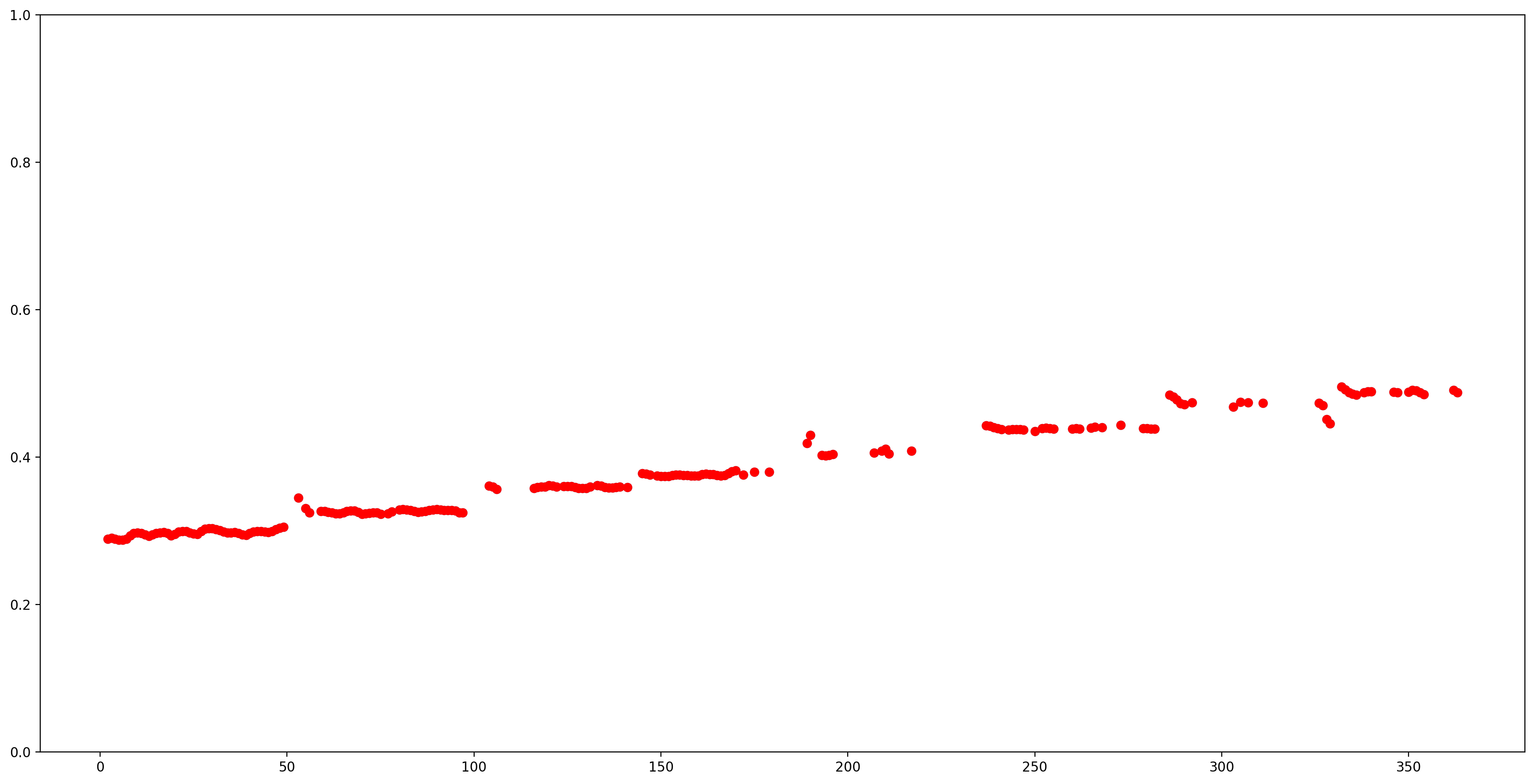
SPICE tarafından döndürülen perde değerleri 0 ile 1 arasındadır. Bunları Hz cinsinden mutlak perde değerlerine çevirelim.
def output2hz(pitch_output):
# Constants taken from https://tfhub.dev/google/spice/2
PT_OFFSET = 25.58
PT_SLOPE = 63.07
FMIN = 10.0;
BINS_PER_OCTAVE = 12.0;
cqt_bin = pitch_output * PT_SLOPE + PT_OFFSET;
return FMIN * 2.0 ** (1.0 * cqt_bin / BINS_PER_OCTAVE)
confident_pitch_values_hz = [ output2hz(p) for p in confident_pitch_outputs_y ]
Şimdi, tahminin ne kadar iyi olduğunu görelim: Öngörülen perdeleri orijinal spektrogramın üzerine yerleştireceğiz. Saha tahminlerini daha görünür kılmak için spektrogramı siyah beyaz olarak değiştirdik.
plot_stft(audio_samples / MAX_ABS_INT16 ,
sample_rate=EXPECTED_SAMPLE_RATE, show_black_and_white=True)
# Note: conveniently, since the plot is in log scale, the pitch outputs
# also get converted to the log scale automatically by matplotlib.
plt.scatter(confident_pitch_outputs_x, confident_pitch_values_hz, c="r")
plt.show()
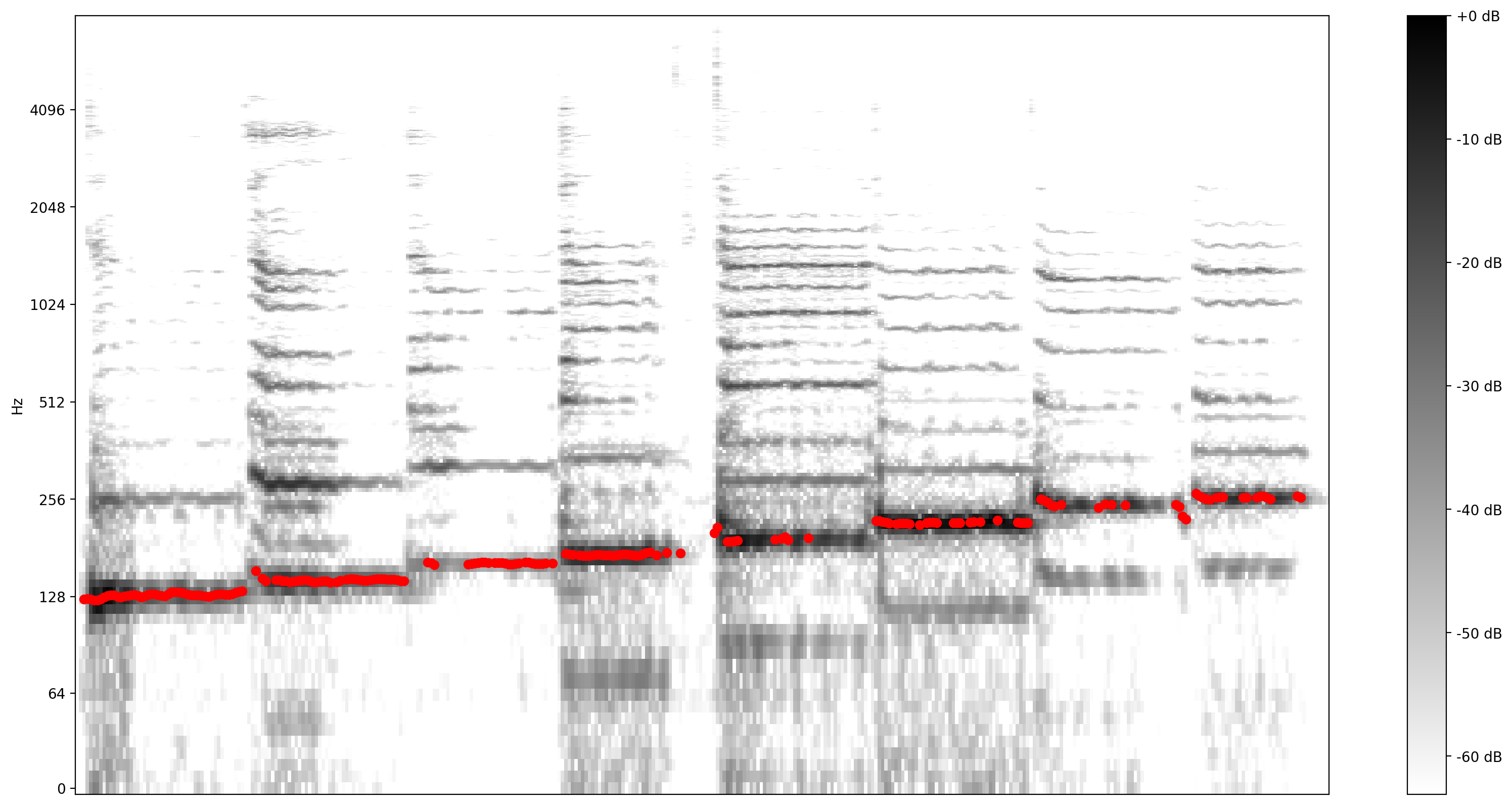
Müzik notalarına dönüştürme
Artık perde değerlerine sahip olduğumuza göre, onları notalara çevirelim! Bu kısım başlı başına zorlayıcıdır. İki şeyi hesaba katmalıyız:
- dinlenmeler (şarkı söylenmediğinde)
- her notanın boyutu (ofsetler)
1: Şarkı olmadığını belirtmek için çıktıya sıfır ekleme
pitch_outputs_and_rests = [
output2hz(p) if c >= 0.9 else 0
for i, p, c in zip(indices, pitch_outputs, confidence_outputs)
]
2: Not ofsetleri ekleme
Bir kişi özgürce şarkı söylediğinde, melodi, notaların temsil edebileceği mutlak perde değerlerine göre bir dengeye sahip olabilir. Bu nedenle, tahminleri notlara dönüştürmek için, bu olası ofset için düzeltme yapılması gerekir. Bu, aşağıdaki kodun hesapladığı şeydir.
A4 = 440
C0 = A4 * pow(2, -4.75)
note_names = ["C", "C#", "D", "D#", "E", "F", "F#", "G", "G#", "A", "A#", "B"]
def hz2offset(freq):
# This measures the quantization error for a single note.
if freq == 0: # Rests always have zero error.
return None
# Quantized note.
h = round(12 * math.log2(freq / C0))
return 12 * math.log2(freq / C0) - h
# The ideal offset is the mean quantization error for all the notes
# (excluding rests):
offsets = [hz2offset(p) for p in pitch_outputs_and_rests if p != 0]
print("offsets: ", offsets)
ideal_offset = statistics.mean(offsets)
print("ideal offset: ", ideal_offset)
offsets: [0.2851075707500712, 0.3700368844097355, 0.2861639241998972, 0.19609005646164235, 0.17851737247163868, 0.27334483073408933, -0.4475316266590852, -0.24651997073237908, -0.1796558047706398, -0.23060136331860548, -0.3782634107643901, -0.4725100625926686, -0.3457194541269999, -0.2436666886383776, -0.1818906877810207, -0.1348077739650435, -0.24551812662426897, -0.4454903457934165, -0.3126792745167535, -0.12241723670307181, -0.06614479972665066, -0.06702634735648871, -0.1744135098034576, -0.29365551425759406, -0.32520890458170726, -0.056438377636119696, 0.1470525135224534, 0.17167006002122775, 0.16529246704037348, 0.09569531546290477, -0.006323616641203955, -0.11799822075907684, -0.18835098459069144, -0.17934754504506145, -0.17215419157092526, -0.23695828034226452, -0.34594501002376177, -0.39380045278613807, -0.2528674895936689, -0.11009248657768467, -0.07118597401920113, -0.08042248799149121, -0.12799598588293293, -0.16227484329287023, -0.05931985421721464, 0.10667800800259641, 0.21044687793906292, 0.2931939382975841, -0.22329278631751492, -0.12365553720538003, -0.4571117360765271, -0.34864566459005175, -0.35947798653189267, -0.4313175396496476, -0.4818928106004421, 0.44220950977261, 0.45883109973128455, -0.47095522924010425, -0.3674495078498552, -0.3047186536962201, -0.31075979246441676, -0.4501382996017185, 0.3966096259778311, 0.4238116671269694, 0.4982676686471237, -0.45932030423227843, -0.4890504510576079, 0.3836871527260044, 0.4441304941600137, -0.38787359430138935, -0.24855899466817277, -0.20666386647764057, -0.23811575664822726, -0.2760223047310504, -0.3641714288169524, -0.41670903606955534, -0.41009272976462086, -0.3340427999073796, -0.26122959716860805, -0.2232610212141708, -0.19940660549943345, -0.22528914465252825, -0.2780899004513415, -0.2744434134537457, -0.25654931231085953, -0.33068201704567457, -0.4678933079416083, -0.4695135511333177, -0.1648153518015647, -0.24618840082233362, -0.48052406086269883, -0.3771743489677135, -0.32261801643912236, -0.25560347987954657, -0.24629741950576545, -0.14035005553309787, -0.16659160448853783, -0.2442749349648139, -0.236978201704666, -0.20882506652418442, -0.22637331529204374, -0.29836135937516417, -0.39081484182421633, -0.3909877680117404, -0.3650093676025108, -0.2642347521955202, -0.13023199393098395, -0.18214744283501716, -0.3020867909366345, -0.33754229827467697, -0.34391801162306024, -0.31454499496763333, -0.26713502510135356, -0.2910439501578139, -0.11686573876684037, -0.1673094354445226, -0.24345334692542053, -0.30852998240535356, -0.35647376789395935, -0.37154654069487236, -0.3600149954730796, -0.2667062802488047, -0.21902000440899627, -0.2484456507736752, -0.2774107871825038, -0.2941432754570741, -0.31118778272216474, -0.32662896348779213, -0.3053947554403962, -0.2160201109821145, -0.17343703730647775, -0.17792559965198507, -0.19880643679444177, -0.2725068260604502, -0.3152120758468442, -0.28217377586905457, -0.11595223738495974, 0.0541902144377957, 0.11488166735824024, -0.2559698195630773, 0.01930235610660702, -0.002236352401425279, 0.4468796487277231, 0.15514959977323883, 0.4207694853966899, 0.3854474319642236, 0.4373497234409598, -0.4694994504625001, -0.3662719146782649, -0.20354085369650932, -0.015043790774988963, -0.4185651697093675, -0.17896653874461066, -0.032896162706066434, -0.061098168330843805, -0.1953772325689087, -0.2545198683315988, -0.3363741032654488, -0.39191536320988973, -0.36531668408458984, -0.3489657612020167, -0.35455202891175475, -0.38925192399566555, 0.48781635300571935, -0.2820884378129733, -0.241939488189864, -0.24987341685836384, -0.3034880535179809, -0.2910712014014081, -0.2783103765422581, -0.30017802073304267, -0.23735882385318519, -0.15802705569807785, -0.1688725350672513, 0.00533368216211727, -0.2545762573057857, -0.28210347487274845, -0.29791870250051034, -0.3228369901949648, -0.3895802937323367, 0.4323827980583488, 0.17439196334535723, -0.12961039467398905, -0.2236296109730489, -0.04022635205333813, -0.4264043621594098, -0.0019025255615048309, -0.07466309859101727, -0.08665327413623203, -0.08169104440753472, -0.31617519541327965, -0.47420548422877573, 0.1502044753855003, 0.30507923857624064, 0.031032583278971515, -0.17852388186996393, -0.3371347884709195, -0.41780861421172233, -0.2023933346444835, -0.10604901297633518, -0.10771248771493447, -0.16037790997569346, -0.18698410763089868, -0.17355977250879562, -0.008242337244190878, -0.011401999431292609, -0.1876701734835322, -0.3601715640598968, 0.011681766969516616, -0.1931417836124183] ideal offset: -0.16889341450193418
Artık söylenen notaların en olası sırasını denemek ve tahmin etmek için bazı buluşsal yöntemler kullanabiliriz. Yukarıda hesaplanan ideal ofset bir bileşendir - ancak nicelemeyi başlatmak için hızı (kaç tahmin, örneğin sekizde biri yapar?) ve zaman ofsetini de bilmemiz gerekir. Basit tutmak için, sadece farklı hızları ve zaman sapmalarını deneyeceğiz ve sonunda bu hatayı en aza indiren değerleri kullanarak nicemleme hatasını ölçeceğiz.
def quantize_predictions(group, ideal_offset):
# Group values are either 0, or a pitch in Hz.
non_zero_values = [v for v in group if v != 0]
zero_values_count = len(group) - len(non_zero_values)
# Create a rest if 80% is silent, otherwise create a note.
if zero_values_count > 0.8 * len(group):
# Interpret as a rest. Count each dropped note as an error, weighted a bit
# worse than a badly sung note (which would 'cost' 0.5).
return 0.51 * len(non_zero_values), "Rest"
else:
# Interpret as note, estimating as mean of non-rest predictions.
h = round(
statistics.mean([
12 * math.log2(freq / C0) - ideal_offset for freq in non_zero_values
]))
octave = h // 12
n = h % 12
note = note_names[n] + str(octave)
# Quantization error is the total difference from the quantized note.
error = sum([
abs(12 * math.log2(freq / C0) - ideal_offset - h)
for freq in non_zero_values
])
return error, note
def get_quantization_and_error(pitch_outputs_and_rests, predictions_per_eighth,
prediction_start_offset, ideal_offset):
# Apply the start offset - we can just add the offset as rests.
pitch_outputs_and_rests = [0] * prediction_start_offset + \
pitch_outputs_and_rests
# Collect the predictions for each note (or rest).
groups = [
pitch_outputs_and_rests[i:i + predictions_per_eighth]
for i in range(0, len(pitch_outputs_and_rests), predictions_per_eighth)
]
quantization_error = 0
notes_and_rests = []
for group in groups:
error, note_or_rest = quantize_predictions(group, ideal_offset)
quantization_error += error
notes_and_rests.append(note_or_rest)
return quantization_error, notes_and_rests
best_error = float("inf")
best_notes_and_rests = None
best_predictions_per_note = None
for predictions_per_note in range(20, 65, 1):
for prediction_start_offset in range(predictions_per_note):
error, notes_and_rests = get_quantization_and_error(
pitch_outputs_and_rests, predictions_per_note,
prediction_start_offset, ideal_offset)
if error < best_error:
best_error = error
best_notes_and_rests = notes_and_rests
best_predictions_per_note = predictions_per_note
# At this point, best_notes_and_rests contains the best quantization.
# Since we don't need to have rests at the beginning, let's remove these:
while best_notes_and_rests[0] == 'Rest':
best_notes_and_rests = best_notes_and_rests[1:]
# Also remove silence at the end.
while best_notes_and_rests[-1] == 'Rest':
best_notes_and_rests = best_notes_and_rests[:-1]
Şimdi nicelenmiş notaları nota notaları olarak yazalım!
Bunu yapmak için iki kütüphaneleri kullanacağız: music21 ve Açık Sac Müzik Görüntü
# Creating the sheet music score.
sc = music21.stream.Score()
# Adjust the speed to match the actual singing.
bpm = 60 * 60 / best_predictions_per_note
print ('bpm: ', bpm)
a = music21.tempo.MetronomeMark(number=bpm)
sc.insert(0,a)
for snote in best_notes_and_rests:
d = 'half'
if snote == 'Rest':
sc.append(music21.note.Rest(type=d))
else:
sc.append(music21.note.Note(snote, type=d))
bpm: 78.26086956521739
[Bunu çalıştırın] Bir müzik notasını göstermek için Açık Nota Ekranı'nı (JS kodu) kullanmak için yardımcı işlev
from IPython.core.display import display, HTML, Javascript
import json, random
def showScore(score):
xml = open(score.write('musicxml')).read()
showMusicXML(xml)
def showMusicXML(xml):
DIV_ID = "OSMD_div"
display(HTML('<div id="'+DIV_ID+'">loading OpenSheetMusicDisplay</div>'))
script = """
var div_id = { {DIV_ID} };
function loadOSMD() {
return new Promise(function(resolve, reject){
if (window.opensheetmusicdisplay) {
return resolve(window.opensheetmusicdisplay)
}
// OSMD script has a 'define' call which conflicts with requirejs
var _define = window.define // save the define object
window.define = undefined // now the loaded script will ignore requirejs
var s = document.createElement( 'script' );
s.setAttribute( 'src', "https://cdn.jsdelivr.net/npm/opensheetmusicdisplay@0.7.6/build/opensheetmusicdisplay.min.js" );
//s.setAttribute( 'src', "/custom/opensheetmusicdisplay.js" );
s.onload=function(){
window.define = _define
resolve(opensheetmusicdisplay);
};
document.body.appendChild( s ); // browser will try to load the new script tag
})
}
loadOSMD().then((OSMD)=>{
window.openSheetMusicDisplay = new OSMD.OpenSheetMusicDisplay(div_id, {
drawingParameters: "compacttight"
});
openSheetMusicDisplay
.load({ {data} })
.then(
function() {
openSheetMusicDisplay.render();
}
);
})
""".replace('{ {DIV_ID} }',DIV_ID).replace('{ {data} }',json.dumps(xml))
display(Javascript(script))
return
# rendering the music score
showScore(sc)
print(best_notes_and_rests)
/tmpfs/src/tf_docs_env/lib/python3.7/site-packages/music21/musicxml/m21ToXml.py:465: MusicXMLWarning: <music21.stream.Score 0x7f276c652190> is not well-formed; see isWellFormedNotation() category=MusicXMLWarning)
<IPython.core.display.Javascript object> ['C3', 'D3', 'E3', 'F3', 'G3', 'A3', 'B3', 'C4']
Müzik notalarını MIDI dosyasına çevirelim ve dinleyelim.
Bu dosyayı oluşturmak için daha önce oluşturduğumuz stream'i kullanabiliriz.
# Saving the recognized musical notes as a MIDI file
converted_audio_file_as_midi = converted_audio_file[:-4] + '.mid'
fp = sc.write('midi', fp=converted_audio_file_as_midi)
wav_from_created_midi = converted_audio_file_as_midi.replace(' ', '_') + "_midioutput.wav"
print(wav_from_created_midi)
converted_audio_file.mid_midioutput.wav
Colab'de dinlemek için onu tekrar wav'a dönüştürmemiz gerekiyor. Bunu yapmanın kolay bir yolu Timidity kullanmaktır.
timidity $converted_audio_file_as_midi -Ow -o $wav_from_created_midi
Playing converted_audio_file.mid MIDI file: converted_audio_file.mid Format: 1 Tracks: 2 Divisions: 1024 Track name: Playing time: ~16 seconds Notes cut: 0 Notes lost totally: 0
Ve son olarak, modelin çıkardığı tahmin edilen perdelerden MIDI aracılığıyla oluşturulan notalardan oluşturulan sesi dinleyin!
Audio(wav_from_created_midi)
